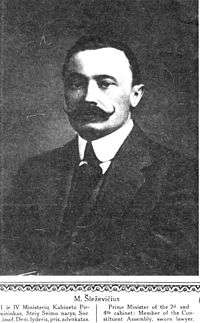Mykolas Sleževičius

Mykolas Sleževičius (February 21, 1882 in Drembliai, Kovno Governorate – November 11, 1939 in Kaunas) was a Lithuanian lawyer, political figure, and journalist, who served as prime minister of Lithuania on three occasions.
Early life
In 1901, Sleževičius graduated from the Gymnasium of Jelgava; he later studied law at Odessa University. Sleževičius took part in the Russian Revolution of 1905. After receiving a law degree in 1907, he returned to Lithuania and joined the Lithuanian Democratic Party.
For the next five years, he worked as editor-in-chief of the newspapers Lietuvos ūkininkas (1907–12), and Lietuvos žinios (1910–12). Later he worked as a lawyer. When the German army occupied Lithuania in 1915, he left for Russia.
Political career

In 1917, Sleževičius was expelled from the Lithuanian Socialist Peasants Party as a result of his agitating for Lithuanian independence from Russia. Later he became an influential member of the Lithuanian Socialist Peasants Democratic Party.
He was appointed as vice-chairman of the Supreme Council of Lithuania in Russia, an organization in which he later served as chairman. In 1918, he was imprisoned by the Bolsheviks in Voronezh. He was eventually released and returned to Lithuania, which had now become an independent nation again.
When the Council of Lithuania officially dissolved the cabinet of the previous prime minister, Augustinas Voldemaras, Sleževičius served as Prime Minister of Lithuania from December 26, 1918, to March 12, 1919. He declined an offer from the military to assume dictatorial powers. A month later, he was again appointed prime minister on April 12, 1919, and held this office until October 7, 1919.
His fourth cabinet established a volunteer army, which became the Lithuanian Armed Forces, and took actions to thwart the aims of the Polish nationalist organization, the Polska Organizacja Wojskowa (POW).[1] This Polish organization believed that Lithuania was a province of Poland and endeavored to make Lithuania part of the Second Polish Republic. Earlier, Voldemaras thought that Lithuanian militias would be a sufficient deterrent against the Polish nationalists; however, widespread dissatisfaction with his previous government bolstered support for the voluntary Lithuanian Armed Forces amongst the Lithuanian population. The Sleževičius government, or "Fourth Cabinet" also laid the foundations for various Lithuanian state institutions, including finances, jurisdiction, and municipalities. The Fourth Cabinet also made the first draft of land reform.
In 1920, after an armed conflict between Poland and Lithuania erupted, Sleževičius was elected chairman of the Lithuanian Defense Committee (Vyriausias Lietuvos gynimo komitetas).
In 1922, Sleževičius was elected to the Lithuanian Parliament as a representative of the Lithuanian Peasant Popular Union. On July 15, 1926 he was again appointed prime minister and held that office until December 17, 1926, when his government was overthrown by a military coup d'état.
After 1927, he worked as a lawyer for various organizations, and was chairman of the Lithuanian Society of Lawyers. He was buried in Petrašiūnai Cemetery of Kaunas.
External links
References
- ↑ Julius, Būtėnas; Mečys Mackevičius (1995). Mykolas Sleževičius: advokatas ir politikas. Vilnius: Lietuvos rašytojų sąjungos leidykla. p. 263. ISBN 9986-413-31-1.
| Preceded by Augustinas Voldemaras |
Prime Minister of Lithuania 26 December 1918 – March 12, 1919 |
Succeeded by Pranas Dovydaitis |
| Preceded by Pranas Dovydaitis |
Prime Minister of Lithuania April 12, 1919 – 7 October 1919 |
Succeeded by Ernestas Galvanauskas |
| Preceded by Leonas Bistras |
Prime Minister of Lithuania June 15, 1926 – 17 December 1926 |
Succeeded by Augustinas Voldemaras |